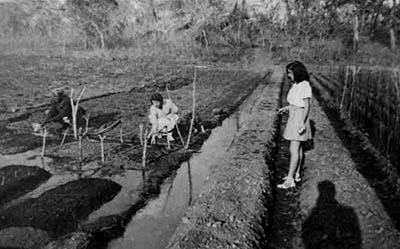Chapter 21 - The Rains
Roy had dug a large garden
beside the river where it was easy to water and I had planted
any vegetable seeds I could get hold of. There was no other way
to get vegetables apart from the few I bought from neighbouring
Africans, so it was necessary to produce something ourselves,
We had mealies, carrots, beans and potatoes, sweet and ordinary,
and they all sprouted up within weeks, but when the rains came
and the furrows were flooded Roy and I were frantically wading
in muddy water to our knees trying to pull up as many as were
ready before they were washed away!. We completely forgot the
danger of snakes and crocs in our desperate efforts to save the
'crop', but were gratified to succeed in saving quite a good
supply of veg.

The rains were now upon us with their attendant storms, and these were a nightmare to me. I felt completely vulnerable and if one came on while the men were at the bridge I would lie on my bed with my head under a pillow, very aware of the bed being iron and hoping the men would be able to run the few yards to the house in safety.
The smell of the first rains is unforgettable. The heat and dust gradually accumulate in a tension which affects everyone, bush fires break out all around the ground is cracked and hard, water is low, insects are vicious and the birds cry their very sad mournful notes over and over again, then suddenly comes the crash of thunder, the blackness, and then a wall of water descends until we all appear to be floating inside a huge waterfall, swaying and pounding all around us and we rush onto it like a baptism, laughing and smelling that combination of wet burnt earth and vegetation, the tensions gone.
A circular letter written to the members of the Forestry Department one October, summed it up this way;
"The Murder Season"
You may not need this reminder. If you don't, I need to write it as a reminder to myself.
The next six weeks is the 'murder season'. You may expect your African staff to be hysterical, and your labourers to cause trouble. Some of them will even go off their heads. You must also take it for granted that all the European staff in the department will be irritable and touchy. People will be irritable and touchy. People will behave unreasonably. From now until the rains have broken, everybody is likely to lose his temper over any trivial matter. Trivial matters will somehow seem to become enormously important, even to yourself.
All this is a perfectly natural phenomenon, like the trees flushing before the rains. Remember it, though you can't do much about it. Don't write much or say much without putting it aside and thinking it over: don't deal with African staff rows without sending everybody away to cool off. Since everybody - and especially H.Q. - is likely to go off the deep end, simply on no provocation at all, my advice from now until December is - keep saying to yourself 'Oh well, he's bats. I hope just temporarily'.
The cement had all been moved into dry quarters, mounds of wood were safely housed, but the work went on with the river rising rapidly and all poles being re-lashed and a different set of cares and precautions and duties to fit the changed weather. The temperature rose high between storms and low just after and it was a time of chills and fevers. Roy had malaria which we attended at home and he was soon better - just a few days of fever with every blanket available piled on him and regular doses of paludrine, then the profuse sweating until he was soaked and changed till it dried up. I had hundreds of mosquito bites on my legs, which I had scratched and they turned septic, so as Alex had another attack of Malaria, we decided to make a visit to Kasama for stores, a convenient time to visit Kasama Hospital and get supplies for our camp. The Sister in charge made us welcome, but after examining us decided that we had better stay in hospital for a few days and we were put into a ward with two beds normally used for women in labour, and rather high!.
Many of the Kasama people came to see us and made the obvious jokes, so that it was more like a holiday than an illness. I never had malaria at Kalungu, and my prescription was to scratch the bite before the poison had a chance to take effect. I was lucky not to be sceptically inclined, but even so it took some days to clean up my bites and Alex and I shared the labour ward during that time. It was a pleasant change to be in semi-civilisation for a short time, but we were always glad to get back to camp, and wondered how the Kasama people could possibly live happily under such boring conditions!.